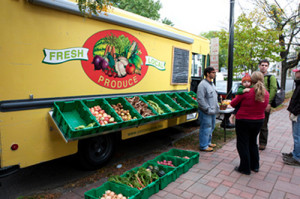I’m all for less regs, not more, and letting producers define and implement best practices. In my version of the Hunger Games, the folks who do the best for food safety tell customers about it win the marketplace.
The best industry groups seek out experts to help them figure out the best way to reduce risks. Others do little, or worse, wait for regulations to tell them what to do.
When our group started working with farmers markets a few years ago we created a strong partnership with the North Carolina Department of Agriculture and Consumer Services. Together, with funding from the North Carolina Tobacco Trust Fund, we developed best practices and engage directly with market managers and vendors through workshops and on-site visits.
Throughout the project, former graduate student Allison Smathers saw some risky practices when it came to providing samples – stuff like dirty equipment and a lack of hand washing. The same factors that led to an E. coli O157:H7 outbreak linked to cantaloupe samples in a Colorado farmers’ market in 2000. Since 2010 the curriculum we developed has been delivered to over 1000 managers and vendors and we’ve got some data that shows it led to some infrastructure and practice changes. All the farmers’ market food safety stuff we have can be found here.
According to the Daily Planet, folks in Minnesota, worried about the restrictive nature of public health laws are trying to clarify their current laws to allow for farmers to provide samples – as long as they are following some sort of risk reduction practices.
Market operators are concerned that Minnesota laws governing food safety haven’t kept pace with the farmer’s market boom. The Minnesota Farmers’ Market Association for the last year has worked with state officials to craft legislation that spells out the health regulations for handing out food samples and doing cooking demonstrations. The result of their negotiations isHF2178, sponsored by Rep. Bob Barrett (R-Lindstrom), which was approved Wednesday by the House Agriculture Policy Committee and referred to the House Floor.
When asked by a regulatory authority, the bill directs people to provide information such as the source of the food or the equipment used in its preparation.
Cecelia Coulter, founder and market manager of the Chisago City Farmers Market, said current laws don’t specify how cooking demonstrations and food samples should be handled at these markets. “This bill is significantly important,” she said, “as it will enable all Minnesota farmers markets, including those in outstate Minnesota, to conduct food sampling and cooking demonstrations without the regulatory hurdles that current policies require but while closely following the existing food code to insure food safety for our public.”
But do the vendors value food safety and follow the best practices?
